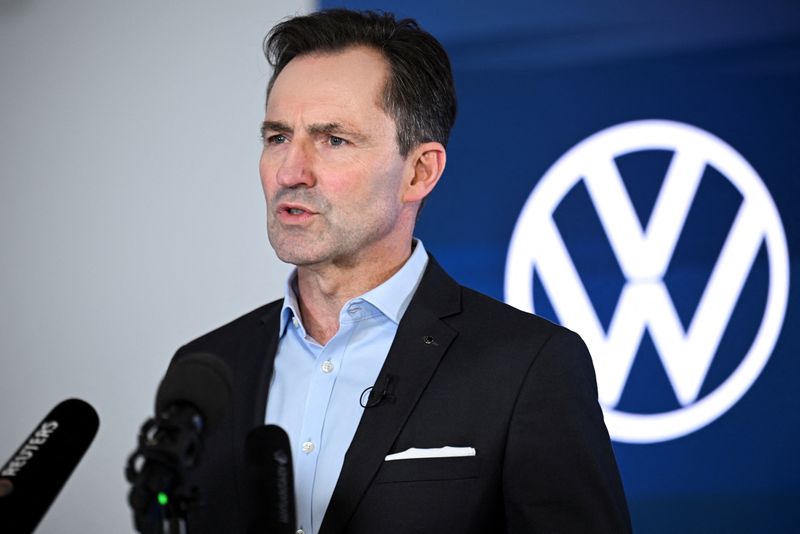By Christina Amann
HANOVER (Reuters) -Volkswagen on Friday introduced sweeping modifications to its German operations, together with greater than 35,000 future job cuts and sharp capability reductions in a last-gasp deal between Europe’s high carmaker and unions to avert mass strikes.
Union leaders hailed the settlement as a “Christmas miracle” after 70 hours of gruelling negotiations, the longest within the firm’s 87-year historical past. There could be no quick web site closures or layoffs, and VW appeared to have backed away from demanding 10% wage cuts.
The deal avoiding expensive strikes can also present reduction to buyers after months of negotiations. Shares rose 2.4% in prolonged commerce after the deal. They’ve misplaced 23% this 12 months .
Volkswagen (ETR:) has been in talks with union representatives since September over measures it referred to as needed for it to compete with cheaper Chinese language rivals and deal with lacklustre demand in Europe and slower-than-expected adoption of electrical automobiles.
Round 100,000 employees have already staged two separate strikes previously month, the most important in Volkswagen’s historical past, protesting towards cost-cutting plans.
“With the package of measures that has been agreed, the company has set a decisive course for its future in terms of costs, capacities and structures,” Volkswagen Group CEO Oliver Blume mentioned in a press release.
“We are now back in a position to successfully shape our own destiny.”
VW mentioned the deal would permit financial savings of 15 billion euros ($15.6 billion) yearly within the medium time period and noticed no important influence on its 2024 steering. Whereas there have been no quick closures, VW mentioned it was wanting into choices for its Dresden plant and repurposing the Osnabrueck web site, together with searching for a purchaser. Some manufacturing could be shifted to Mexico.
Automobile manufacturing would shut on the Dresden plant by the tip of 2025. VW AG’s workers is not going to get raises below a collective wage settlement over the subsequent 4 years, whereas some bonuses might be scrapped or diminished.
Manufacturing at VW’s Wolfsburg plant, its greatest, might be minimize to 2 meeting traces from 4.
“No site will be closed, no one will be laid off for operational reasons and our company wage agreement will be secured for the long term,” mentioned works council chief Daniela Cavallo.
TALKS INTO THE NIGHT
The fifth spherical of negotiations had been below approach since Monday and continued deep into the evening in Hanover this week, with negotiators solely taking brief breaks to sleep and gas up on espresso, curried sausage and fruit.
The 35,000 future job cuts would signify round 1 / 4 of VW’s workforce and are available tandem with decreasing the corporate’s community of German vegetation by greater than 700,000 automobiles.
IG Metall chief negotiator Thorsten Groeger however mentioned the cuts, which might not contain obligatory redundancies, had been a part of an answer to deal with overcapacity and could be achieved in a socially accountable method.
Matthias Schmidt, a European auto markets analyst, mentioned: “35K job cuts on a demographic curve up to 2030 is likely not enough and over a too longer time frame to address the current stagnation we are seeing across the European market.”
He added: “I would say the unions can take more from this than VW but realistically because of the complicated structure of the company this was probably the best they could have realistically hoped for.”
High shareholder Porsche SE welcomed Friday’s deal as a “significant improvement in Volkswagen’s competitiveness”, including it was now essential to implement the cuts.
CAMPAIGN ISSUE
The talks came about in a dated no-frills enterprise lodge on the outskirts of Hanover, the place delegates from either side met in numerous rounds that had been at instances interrupted by breaks throughout which they stocked up on espresso and fruit effectively after midnight.
Some employees performed a spherical of playing cards to decompress.
The disaster at VW has hit at a time of uncertainty and political upheaval in Europe’s largest financial system, in addition to wider turmoil among the many area’s automakers.
The query of how you can repair Germany’s sluggish progress has taken centre stage as a marketing campaign problem forward of a snap election in February, whereas Chancellor Olaf Scholz, trailing within the polls, has urged VW to maintain all its factories open.
Scholz on Friday evening welcomed a “good, socially acceptable solution”, including in a press release, “Despite all the hardships, it ensures that Volkswagen and its employees can look forward to a good future.”
Alexander Krueger, chief economist at Hauck Aufhaeuser Lampe Privatbank, mentioned at first look it gave the impression to be a compromise the edges can stay with.
“Other companies are also pursuing job-cutting plans, and VW appears to be just the beginning,” he mentioned. “Competitive price pressure will probably require further adjustments at a later date.”
Former Volkswagen bosses, together with Herbert Diess and Bernd Pischetsrieder, failed of their makes an attempt to make far-reaching modifications to the Wolfsburg-based carmaker because the unions stood agency.

IG Metall’s risk of strikes was a strong bargaining chip. UBS estimated each strike day in Germany could have value VW as much as 100 million euros in income and round 20 million in working revenue, based mostly on 2,000-3,000 fewer automobiles produced per day.
($1 = 0.9579 euros)




